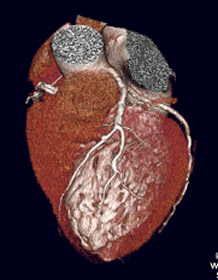Cardiac CT
Computed tomography (CT) is a noninvasive imaging technology that provides detailed pictures of organs and tissues inside the body. Cardiac CT angiography imaging focuses on the heart and its surrounding blood vessels. It is often referred to as a heart scan, calcium score or coronary CT.
MHVI offers state-of-the-art facilities for cardiac CT. Our physicians and technicians perform high quality, precision studies that yield high diagnostic accuracy while preserving patient safety through minimized radiation exposure that cuts down the total dose of radiation to less than half of current national standards.
What are some common uses of the procedure?
Coronary computed tomography (CT) is most commonly performed, and evaluates fatty deposits and/or calcium deposits (plaques) that build up within the coronary arteries. Physicians use these images to help diagnose coronary artery disease, or heart artery blockages, and to estimate the future risk of having a heart attack. Cardiac CT can help doctors treat heart disease and determine if current treatments are effective.
What happens during the procedure?
A Cardiac CT uses X-rays taken at very fast speeds to build two- and three-dimensional images of the heart. For this purpose, doctors need to slow down the heart rate with a medication called a beta-blocker, which is commonly used to treat high blood pressure. Patients also receive an iodine-containing dye through a small IV in the arm. During a single breath hold of 10 seconds or less, the CT scanner rotates at a very fast speed and takes hundreds of images of the heart.
Who should have the procedure?
Cardiac CT is helpful in assessing a wide range of heart conditions, including coronary artery disease, diseases of the aorta, and other structural heart problems. It is particularly helpful in patients who have had an inconclusive stress test, but it may also be used to help surgeons, interventional cardiologists, and electrophysiologists to plan and perform complex heart procedures.
Who shouldn’t have the procedure
Coronary CT is not recommended as a screening test for patients with no symptoms, for patients who are extremely overweight or for patients who have an abnormal/ irregular heart rhythm. Patients who have abnormal kidney function are also not good candidates. As with many types of heart tests, there are risks associated with CT. Your physician should weigh the risks and benefits before ordering the test.
Cardiac CT for Calcium Scoring: screening for coronary artery disease
Coronary CT imaging can also be used to detect calcified plaque buildup in the coronary arteries. Physicians quantify this plaque buildup and come up with a score that has now been shown to be the single most important risk predictor for heart attacks. Cardiac CT for calcium scoring requires no IV or contrast agent and takes a few seconds to complete. In addition, there is only a minimal exposure to X-rays. Insurance companies do not pay for the calcium scoring scan; however the out of pocket cost is minimal. Talk to your physician to see if calcium scoring scan is right for you.


